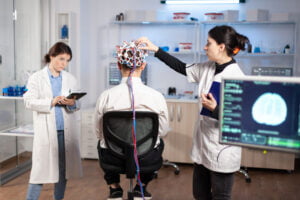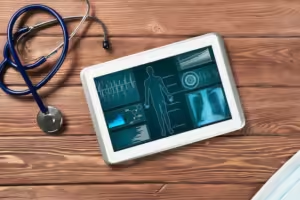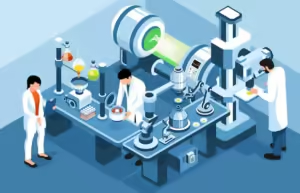The healthcare industry has seen significant advancements in recent years, with artificial intelligence (AI) emerging as a transformative force. One of the most promising areas of AI’s impact is predictive healthcare, which leverages advanced algorithms and data-driven insights to forecast potential health conditions before they manifest.
This shift toward predictive models is revolutionizing how we approach patient care, enabling earlier detection, more accurate diagnoses, and personalized treatment plans that improve overall outcomes.
AI in predictive healthcare not only enhances the ability to detect diseases in their early stages but also plays a crucial role in preventing them by identifying risk factors through analysis of vast amounts of patient data.
By enabling faster and more precise decision-making, AI has the potential to drastically reduce healthcare costs, improve patient experiences, and ultimately save lives. As this technology continues to evolve, it is clear that AI is shaping the future of healthcare, offering innovative solutions for better diagnostics and optimized treatment pathways.
In this blog, we’ll explore how AI is playing a vital role in predictive healthcare, transforming diagnostics, enhancing treatment outcomes, and paving the way for a future where healthcare is more efficient, personalized, and proactive.
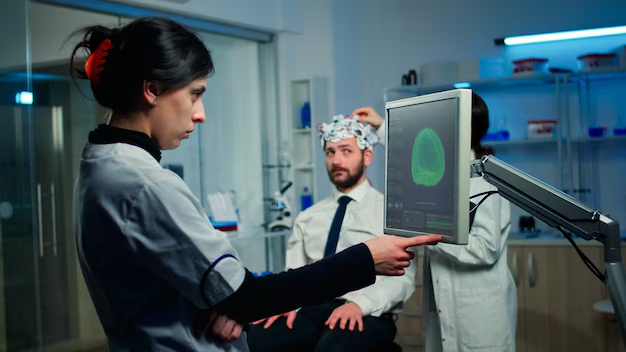
How AI Improves Diagnostics
Artificial intelligence is revolutionizing the diagnostic process in healthcare by enhancing the speed, accuracy, and efficiency with which diseases are detected. Traditional diagnostic methods, while effective, often rely on human interpretation and can be time-consuming or prone to error. AI, on the other hand, uses sophisticated algorithms and machine learning models to analyze vast amounts of patient data, including medical images, lab test results, and patient histories, to identify patterns that might be missed by the human eye. Below are some key ways in which AI is improving diagnostics:
1. AI in Imaging and Radiology
One of the most significant advancements AI has brought to healthcare is in the field of medical imaging. AI-powered tools are capable of analyzing diagnostic images, such as X-rays, MRIs, and CT scans, with remarkable precision. These tools can detect subtle anomalies that may be challenging for radiologists to spot, leading to earlier diagnoses and more accurate results. For example:
- Cancer Detection: AI models are increasingly being used to detect early signs of cancer, such as tumors in mammograms, lung scans, and brain MRIs. These AI systems can analyze patterns and flag suspicious areas that might otherwise go unnoticed.
- Cardiovascular Health: AI can help in identifying signs of heart disease by analyzing imaging data such as echocardiograms or coronary CT angiograms. AI can quickly pinpoint areas of concern, such as blockages or abnormalities in blood vessels, which can help guide treatment decisions.
- Neurological Disorders: AI can assist in identifying early signs of neurological conditions like Alzheimer’s or Parkinson’s by analyzing brain scans, and looking for changes in brain structure or function that indicate disease progression.
2. AI in Lab Test Analysis
Another area where AI is making a significant impact is in the analysis of lab test results. Traditional diagnostic methods often require a manual review of test results, which can be slow and subject to human error. AI can speed up this process by automatically analyzing large datasets from blood tests, genetic tests, and other diagnostic procedures.
- Blood Test Analysis: AI models can detect early warning signs of conditions such as diabetes, kidney disease, or liver dysfunction by analyzing blood test results. These systems can spot patterns or irregularities that could indicate a developing condition, allowing for early intervention.
- Genetic Testing: AI is also being used in genetic diagnostics, where it can help identify mutations or inherited conditions by analyzing genetic sequencing data. This can be crucial for diagnosing genetic disorders early on or assessing the risk of inherited conditions.
3. AI for Personalized Diagnostics
One of the most promising applications of AI in diagnostics is its ability to personalize medical assessments based on individual patient data. AI can process information from various sources—patient medical histories, lifestyle factors, genetic information, and even environmental factors—to create a more complete picture of a patient’s health.
- Tailored Diagnostic Approaches: AI can take into account a patient’s unique risk factors and medical history to recommend personalized diagnostic tests. For example, AI can suggest specific screenings based on genetic predispositions or lifestyle choices (e.g., recommending early heart disease screenings for patients with a family history of cardiovascular issues).
- Predicting Future Health Risks: AI can also predict future health risks based on patterns in a patient’s data. For instance, AI systems can analyze lifestyle habits, genetics, and lab results to predict a patient’s risk for developing conditions like diabetes, stroke, or even mental health disorders, allowing for early intervention and prevention.
AI’s Role in Disease Prediction and Prevention
Artificial intelligence (AI) is playing a transformative role in not only diagnosing diseases but also predicting their onset and preventing their progression. By leveraging vast amounts of patient data, AI is helping healthcare professionals identify potential health risks before they become serious issues, enabling earlier interventions and more proactive care strategies. The predictive power of AI is reshaping the future of healthcare by moving away from a reactive model to a more preventive and personalized approach.

1. Predicting Chronic Diseases
AI’s ability to analyze large datasets and identify patterns is especially valuable in predicting chronic diseases such as diabetes, heart disease, and hypertension. Traditionally, these conditions were diagnosed after they had already developed, often requiring costly treatments and leading to long-term health complications. With AI, healthcare providers can now predict a patient’s likelihood of developing these conditions, even before symptoms appear.
- Diabetes Prediction: AI algorithms can analyze factors like a patient’s age, weight, lifestyle, family medical history, and lab test results to predict the risk of developing type 2 diabetes. By identifying at-risk individuals early, healthcare providers can offer preventive measures, such as lifestyle changes and monitoring, to help reduce the onset of the disease.
- Cardiovascular Disease Risk: AI models can predict the likelihood of heart disease by analyzing factors such as cholesterol levels, blood pressure, heart rate, and other vital signs. By recognizing patterns in this data, AI can alert physicians about patients at high risk of heart attacks or strokes, allowing for early interventions such as medication or lifestyle changes.
2. Early Detection of Life-Threatening Conditions
One of the most powerful aspects of AI in healthcare is its ability to detect life-threatening conditions at an early stage, when they are most treatable. AI-powered systems can process vast amounts of data—such as medical imaging, genetic information, and patient history—to identify subtle signs of disease that might be overlooked by traditional methods.
- Cancer Prediction: AI is increasingly used to predict the risk of various cancers, including breast, lung, and skin cancer. By analyzing medical images, genetic data, and even lifestyle factors, AI can identify patients who may be at higher risk, allowing for earlier screenings and preventive measures.
- Neurological Disorders: AI can predict the early onset of neurological conditions such as Alzheimer’s and Parkinson’s by analyzing changes in brain scans, genetic markers, and patient behavior. Early detection can significantly improve the quality of life for patients and help slow the progression of these debilitating diseases.
3. Preventive Healthcare Models
Beyond simply predicting diseases, AI is also enhancing the ability to implement preventive healthcare models that can reduce the overall burden of illness. These models focus on early intervention, continuous monitoring, and lifestyle modifications to prevent diseases from developing in the first place.
- Personalized Preventive Care: AI can use data from various sources, including electronic health records (EHRs), wearable devices, and genetic testing, to create personalized health plans for individuals. For example, AI can recommend lifestyle changes—such as diet, exercise, and stress management—for patients at risk of chronic conditions, helping to prevent disease development.
- Population Health Management: AI can also be used to analyze health trends across large populations, identifying groups at higher risk for specific diseases. By providing actionable insights, AI can guide public health initiatives, targeted screenings, and preventive programs aimed at improving the health of entire communities.
4. AI for Monitoring and Early Alerts
AI-powered wearable devices and health monitoring tools can continuously track a patient’s vital signs and health metrics, offering real-time data to both patients and healthcare providers. These tools use AI to detect early warning signs of potential health issues, such as abnormal heart rhythms, changes in blood pressure, or glucose levels.
- Wearables for Chronic Disease Prevention: Devices like smartwatches and fitness trackers equipped with AI algorithms can monitor physical activity, heart rate, and sleep patterns, alerting users to potential health risks. For instance, AI can predict the onset of a heart attack or stroke based on real-time data, prompting users to seek immediate medical attention.
- Remote Monitoring for At-Risk Patients: For individuals with chronic conditions, AI-powered remote monitoring can track symptoms and vital signs over time, providing both patients and doctors with ongoing insights. AI can also trigger early alerts if critical changes are detected, allowing for timely interventions and adjustments to treatment plans.
5. Enhancing Public Health and Disease Outbreak Prediction
AI’s predictive capabilities extend beyond individual patient care to broader public health applications. By analyzing large datasets from hospitals, research institutions, and even social media platforms, AI can help predict the spread of infectious diseases and public health crises.
- Epidemic Prediction: AI models have been used to predict the spread of diseases such as COVID-19 and influenza, analyzing factors like mobility data, population density, and healthcare infrastructure to forecast outbreaks. These predictions can help governments and health organizations plan responses, allocate resources, and implement preventive measures.
- Global Disease Surveillance: AI is also enabling global disease surveillance by analyzing health data from around the world to detect emerging threats. This helps in early containment and preventive efforts, particularly for diseases that may otherwise go undetected until they reach a critical stage.
Enhancing Treatment Outcomes with AI
Artificial intelligence (AI) is revolutionizing the way treatments are planned, delivered, and monitored in healthcare. By leveraging advanced algorithms, machine learning, and vast amounts of patient data, AI helps healthcare professionals make more informed decisions that lead to improved patient outcomes. From personalized treatment plans to real-time monitoring, AI is transforming the treatment process, ensuring that patients receive the most effective care tailored to their specific needs.
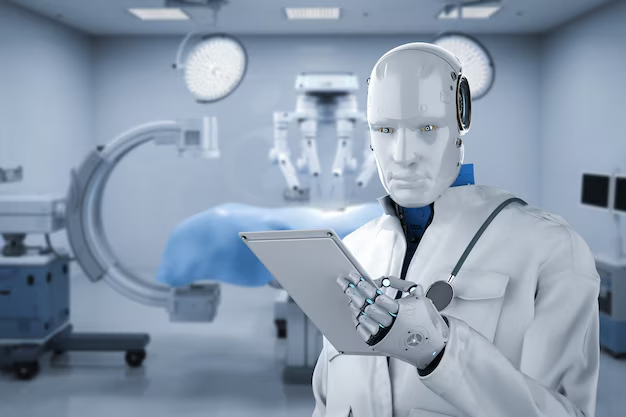
1. Personalized Treatment Plans
AI is increasingly being used to create personalized treatment plans that take into account an individual’s unique genetic makeup, medical history, lifestyle, and preferences. These customized plans can significantly improve the effectiveness of treatments by targeting the specific needs of the patient.
- Precision Medicine: AI allows for the analysis of vast genetic data, enabling the development of precision medicine tailored to a patient’s genetic profile. For example, AI can identify genetic mutations or predispositions that may affect how a patient responds to a particular drug, leading to more effective treatments with fewer side effects.
- Oncology Treatments: In cancer care, AI can analyze a patient’s genetic and molecular data to recommend the most effective cancer therapies. By identifying biomarkers and genetic mutations, AI helps in selecting the right chemotherapy, immunotherapy, or targeted therapy that has the highest chance of success for that particular patient.
2. Real-Time Monitoring and Adjustments
AI-powered technologies, including wearable devices and remote monitoring tools, are enabling real-time tracking of patients’ health conditions during treatment. By continuously collecting data on vital signs, symptoms, and medication responses, AI allows healthcare providers to monitor patients in real time and adjust treatment plans as needed.
- Chronic Disease Management: For patients with chronic conditions such as diabetes, heart disease, or asthma, AI-driven devices can monitor key indicators like blood sugar levels, heart rate, and blood pressure. This continuous data stream helps healthcare providers make timely adjustments to treatment regimens, improving the management of these conditions and preventing complications.
- Adaptive Treatment Plans: AI can also assess how a patient is responding to treatment in real time and suggest adjustments accordingly. For example, in cancer treatment, if a patient is not responding well to a specific therapy, AI can recommend alternative treatment options, ensuring that the patient receives the most effective care.
3. AI in Drug Development and Optimization
AI is playing a critical role in accelerating the process of drug development and optimizing existing treatments. By analyzing large datasets, AI can identify potential drug candidates, predict how different drugs will affect patients, and enhance the development of therapies.
- Accelerating Drug Discovery: AI can process vast amounts of data from clinical trials, research papers, and genetic databases to identify promising drug candidates more quickly. This can significantly reduce the time and cost associated with bringing a new drug to market, potentially leading to faster treatment options for patients.
- Optimizing Existing Medications: AI can also help optimize the use of existing medications. For example, AI can suggest new combinations of drugs or adjust dosages based on patient characteristics to maximize effectiveness while minimizing side effects.
4. AI-Enhanced Surgical Precision
In surgery, AI is improving outcomes by assisting surgeons with pre-operative planning, intra-operative guidance, and post-operative monitoring. AI-driven tools can analyze imaging data, assist in identifying key structures, and provide real-time feedback during procedures, enhancing surgical precision.
- Robotic-Assisted Surgery: AI-powered robotic systems can assist surgeons in performing delicate procedures with greater precision and control. These systems use real-time data and machine learning algorithms to guide the surgeon, reducing the risk of human error and improving recovery times for patients.
- Pre-Surgical Planning: AI can also assist in creating detailed pre-surgical plans based on patient-specific data. By analyzing medical images, such as CT scans or MRIs, AI systems can help surgeons identify the best approach for a procedure, reducing complications and improving post-operative outcomes.
5. Predicting and Preventing Treatment Complications
AI plays an important role in predicting and preventing potential complications that may arise during treatment. By analyzing patient data and treatment protocols, AI can identify risks early on, helping clinicians take preventive measures to avoid complications.
- Identifying Risk Factors: AI can identify early warning signs of complications such as infections, organ failure, or adverse reactions to medication. By recognizing patterns and trends in patient data, AI can alert healthcare providers to take action before these complications become severe.
- Patient Risk Stratification: AI can assist in risk stratification by analyzing a patient’s medical history, lab results, and real-time health data to determine their likelihood of experiencing complications during treatment. This allows clinicians to prioritize high-risk patients for closer monitoring and more intensive interventions.
6. Improving Treatment Adherence
Treatment adherence is a major factor in determining the success of medical treatments. AI-driven tools are helping improve patient compliance by providing reminders, offering educational content, and monitoring patient progress.
- Medication Adherence: AI-powered apps and devices can send reminders to patients to take their medication on time, track their adherence, and alert healthcare providers if a patient misses a dose. This helps ensure that patients follow their prescribed treatment plans, improving the likelihood of successful outcomes.
- Patient Education: AI chatbots and virtual assistants can provide patients with tailored educational materials about their condition and treatment, helping them better understand their therapy and its importance. This empowers patients to take a more active role in their care and improves overall treatment adherence.
Conclusion
AI is rapidly transforming healthcare by enhancing treatment outcomes through personalized care, real-time monitoring, and predictive analytics. From creating customized treatment plans based on a patient’s unique genetic and medical profile to providing ongoing adjustments during treatment, AI is ensuring that patients receive the most effective care tailored to their individual needs. The integration of AI in drug development, surgical precision, and chronic disease management is improving efficiency and reducing the risk of complications, ultimately leading to better patient outcomes.
As AI technologies continue to evolve, their role in healthcare will become even more integral, ushering in a future where medical treatments are more accurate, timely, and personalized. By harnessing the power of AI, healthcare professionals can not only enhance the quality of care but also improve the overall patient experience, making healthcare systems more efficient and sustainable. With ongoing advancements, AI has the potential to revolutionize the way treatments are delivered, leading to a healthier, more proactive approach to patient care.


